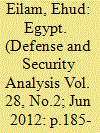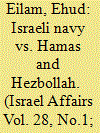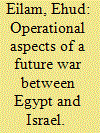|
|
|
Sort Order |
|
|
|
Items / Page
|
|
|
|
|
|
|
| Srl | Item |
| 1 |
ID:
150098


|
|
|
|
|
| Summary/Abstract |
Iran's nuclear program survived, and the American decision to concentrate on ISIS in both Syria and Iraq has been at the expense of blocking Iran in both those countries. Sunni-led Arab states tolerate the pro-Iranian regime in Baghdad but in Syria they want to topple Assad and by that also to inflict a blow to Iran's position in the Levant. Israel has been dealing with an Iranian partner, Hamas, but several major constraints prevent Israel from crushing this outfit.
|
|
|
|
|
|
|
|
|
|
|
|
|
|
|
|
| 2 |
ID:
113116


|
|
|
|
|
| Publication |
2012.
|
| Summary/Abstract |
The new government in Egypt will have to deal with the following challenges in its foreign policy: the Palestinians, Sinai, the arms race between Israel and Egypt, the nuclear issue, the Suez Canal, and the Tiran Straits. Egypt has to decide what its approach would be toward these issues and as to how to maneuver between its own interests and those of other states such as Israel and the USA. All the sides have to consider their steps carefully in order to avoid an unnecessary crisis.
|
|
|
|
|
|
|
|
|
|
|
|
|
|
|
|
| 3 |
ID:
189737


|
|
|
|
|
| Summary/Abstract |
The Israel Defense Forces (IDF) have been at war with Hizbullah and Hamas, two powerful non-state actors, several times throughout Israel’s history. In the next war, the IDF will seek to gain a decisive and quick victory, by launching a large-scale offensive, and strive to destroy military targets, such as rockets. It will continue to rely heavily on firepower, mostly from the air, while carrying out a limited manoeuvre on the ground to reduce its casualties. Yet, Ehud Eilam argues, a massive ground offensive might be needed with such a buildup being based on the air force, infantry and intelligence.
|
|
|
|
|
|
|
|
|
|
|
|
|
|
|
|
| 4 |
ID:
183987


|
|
|
|
|
| Summary/Abstract |
The Israeli navy prepares to confront Arab non-state actors, mostly Hamas and Hezbollah. Hezbollah might attack Israel’s sea lanes in the Mediterranean Sea, while both Hamas and Hezbollah might strike Israel’s natural gas rigs and the Israeli coastline, where most of the Jewish state’s population and infrastructure are located. The Israeli navy will support ground forces by gathering intelligence and by striking targets. Yet, the Israeli navy does not have significant firepower so the IAF will assist in this matter. The Israeli navy also lacks the ability to conduct vast amphibious operations. The IDF can invest in this field sicne such a maneuver can be a game changer.
|
|
|
|
|
|
|
|
|
|
|
|
|
|
|
|
| 5 |
ID:
119716


|
|
|
|
|
| Publication |
2013.
|
| Summary/Abstract |
Israel might attack the Iranian oil industry or the Iranian leadership in order to weaken and if possible to bring down the regime. Yet Israel would probably focus on Iran's nuclear sites. Israel could launch planes, long range missiles and special forces. The United States could give Israel her biggest bunker buster bomb, the GBU-57B and a B-52 to carry it, so Israel could postpone her raid because such an arsenal would allow her to crack Iranian sites even a year from now.Either way the United States might be called help save Israeli air crews.
|
|
|
|
|
|
|
|
|
|
|
|
|
|
|
|
| 6 |
ID:
114692


|
|
|
|
|
| Publication |
2012.
|
| Summary/Abstract |
The peace treaty between Israel and Egypt has survived since 1979. Even so, following the events in Egypt, there is a growing tension between the two states, particularly surrounding the Sinai, which could cause a crisis and even a war. In such a case, the main battlefield would be in Sinai, and there would be several dominant aspects. Some of them would appear for the first time, compared with previous wars, such as a collision between Israeli and Egyptian units of around corps size. Other aspects would be more familiar, such as the ratio between the size of the forces to that of the battlefield, the "fog of war," night fighting, "friendly fire" and deception.
|
|
|
|
|
|
|
|
|
|
|
|
|
|
|
|
| 7 |
ID:
182022


|
|
|
|
|
| Summary/Abstract |
In recent decades there has been a clear decline in both the scale and how deep the Israeli military had penetrated into enemy territory. The article first examines how Israel managed to gain impressive victories in high intensity wars, mostly in 1967, by carrying out large scale ground offensives. Then the article argues that in fighting non state actors (Hezbollah/Hamas) in the 1990s, and in the 2006, 2008-2009 and 2014 wars, Israel relied too much on air power and not on a major ground offensive. The reasons for this approach were fear of the political ramifications. Israel also strongly wished to avoid heavy casualties, of both Israelis and Arab noncombatants.
|
|
|
|
|
|
|
|
|
|
|
|
|
|
|
|
|
|
|
|
|